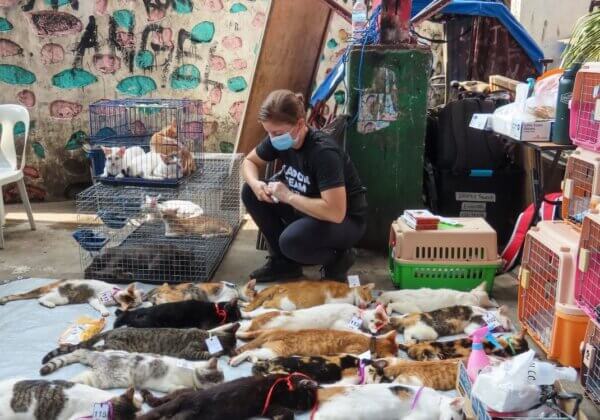PETA Demands Ajinomoto Open their Eyes at Shareholders Meeting
A lot has changed since the 1950s. But one thing that hasn’t is food conglomerate Ajinomoto’s horrific and worthless experiments on animals. So as the company’s shareholders gathered for their annual meeting in Tokyo, PETA made sure attendees were met with an eye-opening sight.
PETA US bought stock in the company in 2020 in order to present shareholder resolutions to end experiments on animals, and the group had applied to speak at the annual meeting. A PETA Asia representative was planning to pose the question, “When will Ajinomoto follow the global trend and ban all animal tests that are not explicitly required by law?” PETA wasn’t permitted to speak, but animal advocates weren’t going to let that stop them from exposing the horrors taking place inside Ajinomoto’s laboratories.
For decades, the company—which is the world’s largest manufacturer of MSG and the owner of brands including Hondashi, Consommé and Knorr has been tormenting and killing animals in tests that are neither required by law nor relevant to human health. It conducts the experiments just to make questionable health claims to market its products.
@petaasia_japan #味の素 #動物実験 の残忍さを見て👁 petaasia.com/ajinomoto #動物 #目隠し #Habit ♬ オリジナル楽曲 – HIKAKIN ヒカキン公式
Ajinomoto experimenters have cut open dogs’ stomachs, inserted tubes into them, starved the animals, fed them MSG, taken their stomach fluid, and injected them with drugs. Some of Ajinomoto’s other tests have involved inserting tubes into day-old piglets’ arteries and starving them, electroshocking rats, and compelling mice to fight each other.
The company is inflicting this suffering on animals in spite of the fact that superior, non-animal test methods are readily available, and in violation of its own policy to replace, reduce, and refine the use of animals in experiments.
You Can Help
Please use PETA’s form to urge Ajinomoto to join dozens of other global food giants, including Kellogg, Kikkoman, and Coca-Cola, that have ended animal tests and switched to effective, ethical, economical, non-animal research.










